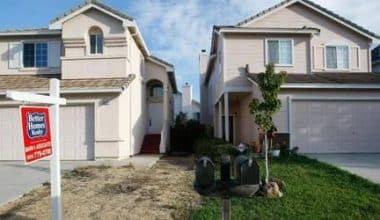Buying a house comes with many decisions, from checking the location to the price and the security in that vicinity. More than these, another factor that is usually taken into consideration is the type of house you want. Hence, you might want to know the difference between a condo and a townhouse before considering the one to choose. Let’s go over the difference between a condo and a townhouse with an insurance apartment.
What Is a Condo? The Basics
A condo, also known as a condominium, is a single-family residence set within a larger building. Condo layouts differ by building, however, most buildings feature numerous units per floor, so other apartments may be upstairs, beneath, or beside you. They can be located anywhere, from luxurious elevated cities to suburban residential complexes.
What Is a Townhouse?
A townhouse is a hybrid of a single household and a condo. They’re usually two or three stories tall and connect walls with the homes next door, but there are no units up or down. Townhouses are a common choice for first-time purchasers and young couples, and they are also available in age-restricted active adult neighborhoods.
What’s the Difference Between a Condo and a Townhouse
The main differences between the two are ownership and fees. Hence, what you possess and how much you spend for it are the key point of the condo and townhouse difference. And they are frequently crucial factors in determining which one is a good fit. Let’s check out the following to know more about the differences.
#1. Different Types of Ownership
One of the primary distinctions between a condo and a townhouse is who is accountable for upkeep as an owner. When you purchase a condo, you are only accountable for the interior of your specific unit. And you will normally pay homeowners’ organization fees to handle the exterior, amenities, and common property upkeep.
There are two types of ownership for townhouses: fee simple and condominium. Because you only control the inside of a townhome when you own a condominium, the maintenance of the home’s exterior and yards is paid by HOA fees. Hence, you will be accountable for the upkeep of your home as well as the front, back, and side yards if you have fee-simple ownership.
#2. Amenities
Another difference between a condo and a townhouse is the amenities and shared areas provided. Amenities differ depending on the neighborhood or building. However, the most condo includes fantastic amenities, such as pools and gyms, that members may use. Townhouses often have fewer facilities than condos, but some modern building townhome communities have more. The majority of townhomes include a clubhouse, playground, pool, or other facilities. Yet, many new townhomes, particularly in age-restricted active adult communities, provide resort-style facilities. Some even have tennis courts and private gyms where group exercise programs are held.
#3. Solitude
Another significant difference between the two types of homes is privacy. Condo and townhouse owners often enjoy less solitude than single-family homeowners. However, this comes with the advantage of living in a residence that is easier to manage. If having a personal yard space or avoiding loud neighbors is important to you, a townhouse may be a better option than a condo. Townhouses typically provide greater privacy than condos because you’ll only have neighbors on either side of you rather than above and below you. You’ll also most probably have a yard distinct from the other shared amenities where your children or dogs can play.
#4. Fees for Homeowners Association
Townhouses usually have lower HOA costs since they need less care and have fewer amenities. Nevertheless, this does not always imply that you will spend less to manage a townhouse. If you do not pay HOA fees for the maintenance of your townhouse’s landscape or exterior, you will be liable for paying for it when due.
#5. Rules and Regulations
Because HOAs take a bigger role in condominiums, the rules and restrictions are generally tighter than in townhomes. There are advantages and disadvantages to having additional rules, depending on your choices as a homeowner. Some individuals want more freedom of expression in their landscaping and building, whilst others prefer a more consistent appearance. These restrictions can be beneficial since they make things like allocating parking places and keeping up with upkeep more efficient. But they may limit your ability to customize the property to your preferences.
Difference Between Condo and Townhouse and Apartment
An apartment is a type of rental property that is frequently owned (instead of simply maintained) by a property manager. Depending on the conditions, it is situated in a residential structure, complex, or neighborhood. All of the flats in an apartment complex are the same, as is the owner, and all of the renters obey the same guidelines for leasing a flat in the building. Each tenant answers to the same property management company. who may be either at the front of the neighborhood or in the rental department within the complex.
Renting an apartment allows you to have lease flexibility. This makes it a fantastic alternative if you don’t intend to stay in one place for a lengthy amount of time. Renting an apartment also enables you to test the waters in a new place before committing to something more long-term. The following are the specific difference between condo, townhouse, and apartment.
Difference Between Condo and Townhouse and Apartment
Condo: Ownership
Individually owned and the administration is frequently by the owner personally or within the cover of the condo’s HOA.
Townhouse: Ownership
Individually owned and the maintenance is by the building’s HOA
Apartment: Ownership
An owner is a single person, typically a company, and rents to numerous tenants
Fees: Condo
HOA costs are paid on a monthly basis.
Fees: Townhouse
Due to the owner or the HOA on a monthly basis
Fees: Apartment
If applicable, monthly rent and maintenance fees
What you are renting: Condo
Your own unit, but not the property or any common places
What You are renting: Townhouse
Your house, as well as the ground on which it rests and potentially a yard
What you are renting: Apartment
Your personal unit
Amenities: Condo
Condos frequently offer common amenities such as a swimming pool or a fitness center.
Amenities: Townhouse
There may also be common amenities such as a swimming pool or a fitness center.
Amenities: Apartment
It is dependent on the agreement and the unique building.
Responsibilities: Condo
You are not responsible for trimming the grass or performing any other maintenance.
Responsibilities: Townhouse
You are not responsible for mowing the grass or performing any other maintenance.
Responsibilities: Apartment
The landlord is responsible for maintenance.
Autonomy: Condo
An owner’s organization may enforce restrictions that you must observe.
Autonomy: Townhouse
You may also be bound by the rules of a homeowners association.
Autonomy: Apartment
You are required to follow the rules and regulations established by the owners.
Best suited for Condo
Seniors who desire to live independently or downsize
Best suited for Townhouse
Those seeking more room than a condo but without the responsibility of a house
Best suited for Apartment
Those who want the freedom to relocate or save for a down payment.
Difference Between Condo and Townhouse Insurance
You’ll need insurance for your condo and townhouse despite the difference in them. While homeowners insurance may appear to be ideal for a townhouse, there are a few aspects to consider before getting insurance.
What Is Coverage for Townhouse Insurance? (Difference Between Condo and Townhouse Insurance)
There is no such thing as “townhouse insurance,” so you’ll need to analyze your living environment to determine your coverage. If you live in a townhome that is not owned by a condo association, you should consider getting renters or homeowners insurance.
As an Owner of A Townhouse. (Difference Between Condo and Townhouse Insurance)
If your townhouse is your personal property and not part of a condo association, you’ll need homeowners insurance coverage to safeguard it. Home insurance for townhouses covers the same items as it does for single-family homes, including:
- Fire, smoke, wind, and other natural catastrophes or dangers
- Structure damage to your home
- Your personal belongings have been stolen or damaged.
- Protection from liability if someone is wounded on your premises.
Other coverages can be added to your home’s policy to assist cover expenses such as equipment breakdown, disaster, or even identity fraud.
If You Rent Out Your Townhouse, You Must: (Difference Between Condo and Townhouse Insurance)
If you lease your townhouse and it is not part of a condo association, renters insurance can help you safeguard your private possessions in the case of an accident or theft. Townhouse renters insurance can help cover problems like:
- Fire damage to your private possessions
- Restoring your personal property once it has been stolen
- Liability coverage in the event that someone gets injured in your townhome.
- Your renters’ insurance accompanies you wherever you go, even when you’re not at home.
If Your Townhouse Is Part of a Condo Association: (Difference Between Condo and Townhouse Insurance)
Condo association policies normally only cover common spaces and the exterior of the building in which you live. While some will insure the interior if it is in its original condition. You’ll want to purchase your own condo insurance policy to safeguard your personal belongings. And any interior upgrades you’ve made, such as granite countertops to replace the existing vinyl.
Condo insurance protects items that are not protected by your condo association’s insurance policy. Personal possessions and personal liability coverage are included, which can assist pay costs if someone is hurt on your premises. Even though your condo association insurance policy protects some of the same things that a condo insurance policy would, you should seek condo insurance to fill any gaps in coverage.
Advantages and Disadvantages
A condo or townhouse can be an excellent choice for folks who prefer city life, particularly first-time homebuyers. Not having to bother about external maintenance, such as gardening or landscaping, or roof replacement. And makes condos appealing to some people, and getting access to certain amenities is a plus for others. Likewise, having a little yard in which to sit or garden is a big attraction for townhouses. Especially for those who want some of the characteristics of a conventional single-family home but prefer a more urban living experience.
But, there are some disadvantages to living in a condo or townhouse. Condos and townhouses can be costly to acquire, particularly condos, and obviously it depends on how an individual HOA operates, they may or may not be worth the money spent. Some people find the limiting nature of an HOA bothersome. Wish they could do more of what they want without having to ask neighbors (in which case, a separate property not affiliated with an HOA is the ideal alternative).
Difference Between Condo and Apartment
The most significant difference between a condo and an apartment is possession, which is ownership. An apartment is a rental residence that is usually part of a bigger residential house. A condo is comparable to an apartment in structure — typically a unit within a bigger residential house — but condos are owned rather than rented. The owner of a condo pays the property taxes; landlords, not apartment renters, pay the property taxes for an apartment.
Because the structures of condos and apartment complexes is similar, their amenities and locations are frequently equivalent. Both types of homes may have amenities such as a pool, trash disposal, manicured green spaces, on-property gyms, and more.
The difference between a condo and an apartment is that a condo owner builds equity, and pays monthly homeowners association (HOA) dues. And also responsible for all interior care, whereas an apartment renter pays rent each month, does not generate equity, and depends on the landlord to handle maintenance problems.
Which Is Cheaper Townhouse or a Condo?
Due to the lack of land, condos are frequently less expensive than townhouses; the exterior and land are seen as common areas shared by all inhabitants. Due in part to the fact that they include outside care, homeowner association (HOA) costs for condo owners can be much more than those for townhomes.
Which Is Preferable, a Condominium or a House?
A condo can be a better option if you don’t want to bother about maintenance as much. More benefits – Unlike houses, condo developments can have features like security systems and amenities like a pool or playground.
More benefits – Unlike houses, condo developments can have features like security systems and amenities like a pool or playground.
Is a Townhouse a Good Investment?
Yes is the clear-cut response. Townhomes retain their value over time. Townhouses, however, lose value more quickly than single-family residences. They also recover from market losses more slowly.
What Similarities Exist Between a Townhouse and a Condominium?
Townhouses and condos can share a wall or walls, making them similar in that respect. Compared to condos, townhomes are more of a style. Townhomes typically resemble single-family homes more. Usually two stories high and built in a row, resembling an east coast brownstone.
Usually two stories high and built in a row, resembling an east coast brownstone.
Why Living in a Condo is Better?
Typically, a condo is less expensive than a standalone home. Condos have substantially smaller interior spaces, and because you simply have to maintain the inside, maintenance costs are often lower. The roof, the external walls, and the landscaping are all taken care of.
Is Owning a Condo Worth It?
Condominiums do typically increase in value. It doesn’t need to have wheels or come from a trailer park for that to be the case with any piece of real estate. However, if you’re deciding between a condo and a house, bear in mind that a single-family home will often increase in value more quickly than a condo.
Why Do People Buy Condos?
Living in a condo gives people the chance to experience homeownership without having to deal with yard work, snow removal, or home repairs. You just need to worry about your living space because a cleaning or maintenance crew takes care of the building’s hallways, entryways, and communal areas as well.
Conclusion
The above guide has shown the difference between a condo and a townhouse and I believe you are clear and know which one to go for.
Difference Between Condo and Townhouse FAQ
what is the similarity between condo and townhouse?
The only similarity between a condo and a townhouse is that they share a wall or rather walls.
Are there any rules in condo and towhouse
Yes!. HOAs take a bigger role in condominiums, the rules and restrictions are generally tighter than in townhomes.
Difference Between Condo and Apartment?
The most significant difference between a condo and an apartment is possession, that is ownership.
{
“@context”: “https://schema.org”,
“@type”: “FAQPage”,
“mainEntity”: [
{
“@type”: “Question”,
“name”: “what is the similarity between condo and townhouse?”,
“acceptedAnswer”: {
“@type”: “Answer”,
“text”: “
The only similarity between a condo and a townhouse is that they share a wall or rather walls.
“
}
}
, {
“@type”: “Question”,
“name”: “Are there any rules in condo and towhouse”,
“acceptedAnswer”: {
“@type”: “Answer”,
“text”: “
Yes!. HOAs take a bigger role in condominiums, the rules and restrictions are generally tighter than in townhomes.
“
}
}
, {
“@type”: “Question”,
“name”: “Difference Between Condo and Apartment?”,
“acceptedAnswer”: {
“@type”: “Answer”,
“text”: “
The most significant difference between a condo and an apartment is possession, that is ownership.
“
}
}
]
}
Related Articles
- FHA APPROVED CONDO: The updated list & How to get one (+ free tips)
- What is a Co-op: How to Get a Co-op Housing in 2022
- BUYING AN APARTMENT: Step-by-step Beginners Guide
- Mortgage Calculator Refinance Guide: Overview, Comparisons, & All you need
- FEE SIMPLE VS LEASEHOLD: What’s The Difference & Things You Need To Know
- HOUSE STAGING: How to Prepare Your Home for Quick Sales
- CONDO VS APARTMENT VS. TOWNHOUSE: What’s the Difference?






